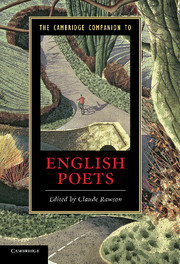Book contents
- Frontmatter
- Introduction
- 1 Geoffrey Chaucer
- 2 Thomas Wyatt
- 3 Edmund Spenser
- 4 William Shakespeare
- 5 John Donne
- 6 Ben Jonson
- 7 George Herbert
- 8 John Milton
- 9 Andrew Marvell
- 10 John Dryden
- 11 Jonathan Swift
- 12 Alexander Pope
- 13 William Blake
- 14 Robert Burns
- 15 William Wordsworth
- 16 Samuel Taylor Coleridge
- 17 George Gordon, Lord Byron
- 18 Percy Bysshe Shelley
- 19 John Keats
- 20 Alfred Lord Tennyson
- 21 Robert Browning
- 22 Emily Brontë
- 23 Christina Rossetti
- 24 Thomas Hardy
- 25 William Butler Yeats
- 26 D. H. Lawrence
- 27 T. S. Eliot
- 28 W. H. Auden
- 29 Philip Larkin
- Further Reading
- Index
15 - William Wordsworth
Published online by Cambridge University Press: 28 May 2011
- Frontmatter
- Introduction
- 1 Geoffrey Chaucer
- 2 Thomas Wyatt
- 3 Edmund Spenser
- 4 William Shakespeare
- 5 John Donne
- 6 Ben Jonson
- 7 George Herbert
- 8 John Milton
- 9 Andrew Marvell
- 10 John Dryden
- 11 Jonathan Swift
- 12 Alexander Pope
- 13 William Blake
- 14 Robert Burns
- 15 William Wordsworth
- 16 Samuel Taylor Coleridge
- 17 George Gordon, Lord Byron
- 18 Percy Bysshe Shelley
- 19 John Keats
- 20 Alfred Lord Tennyson
- 21 Robert Browning
- 22 Emily Brontë
- 23 Christina Rossetti
- 24 Thomas Hardy
- 25 William Butler Yeats
- 26 D. H. Lawrence
- 27 T. S. Eliot
- 28 W. H. Auden
- 29 Philip Larkin
- Further Reading
- Index
Summary
Here is what happened when Crabb Robinson read Wordsworth’s great Ode beginning ‘There was a time’ (generally known after 1815 as the ‘Immortality Ode’) to William Blake in 1825.
I had been in the habit when reading this marvellous Ode to friends, to omit one or two passages – especially that beginning
But there’s a tree of many one,
lest I should be rendered ridiculous, being unable to explain precisely what I admired – Not that I acknowledged this to be a fair test: But with Blake I could fear nothing of the Kind, And it was this very Stanza which threw him almost into an hysterical rapture – His delight in Wordsworth’s poetry was intense [And seeming undiminished deleted] nor did it seem less notwithstandg by the reproaches he continually cast on W [which I have anticipated and which he characterised as Atheism that is, in worshipping nature deleted] for his imputed worship of nature – which in the mind of Blake constituted Atheism.
The narrative tells us a good deal about early reception of Wordsworth. Robinson is worried about appearing ridiculous. Why? Not because he doubts whether every part of Wordsworth’s Ode is admirable, but because he knows that he cannot explain his admiration for every part of it. Perhaps Robinson had already had the experience of becoming ridiculous in this way. Yet, on this occasion, he knows not to worry. Blake, madder than even Wordsworth could ever be, experiences a near-‘hysterical rapture’. ‘Hysterical’, of course, intimates to us Robinson’s own partial scepticism about Blake and his raptures, and, in doing so, intimates that some of the ambivalence about this passage of Wordsworth’s poem, that ambivalence which Robinson attributes to his auditors, may after all be Robinson’s own.
- Type
- Chapter
- Information
- The Cambridge Companion to English Poets , pp. 291 - 307Publisher: Cambridge University PressPrint publication year: 2011
- 1
- Cited by



